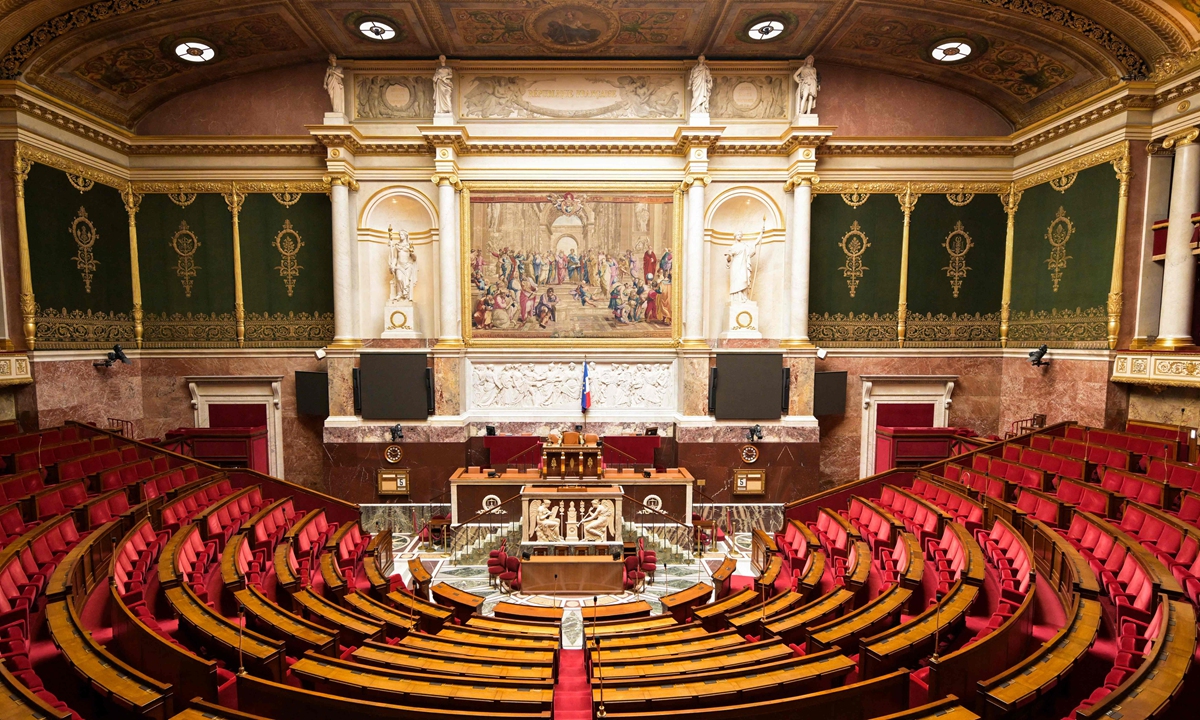
A general view shows empty seats at France's National Assembly in Paris on July 8, 2024, a day after the second round of France's legislative election. Photo:VCG
The results of the second round of France's legislative election came out with a surprising twist on Sunday night local time, as the left-wing parties' alliance won the decisive round, contrary to previous projections.
Although the far-right has been successfully blocked, a parliament without a majority may lead to uncertainty in France, while the influence of the far-right has not diminished, experts said.
With no party managing to secure an absolute majority, left-wing alliance New Popular Front (NFP) is expected to hold between 175 and 205 seats in the 577-member French National Assembly, according to projections published by research firm Elabe. French President Emmanuel Macron's coalition comes in second with the possibility of getting 150 to 175 seats, while the far right party and its allies would only obtain 115 to 150 seats, Elabe said, as quoted by the Xinhua News Agency.
For the National Rally (RN), this result is far from the easy victory predicted by opinion polls in recent weeks. "Crazy" was the word that French left-wing newspaper Libération used to summarize the events of the evening on its front page.
France now faces several weeks of political negotiations to determine who will be the prime minister and lead the National Assembly. Macron faces the prospect of leading the country alongside a prime minister who opposes most of his domestic policies. The EU's pillar and its second largest economy will be plunged into tense uncertainty, and it is unclear who can work with President Macron to serve as prime minister, analysts noted.
These elections were also plagued by violence. More than 50 candidates were reportedly attacked physically, which is extremely rare in French elections. Meanwhile, on Sunday night after the second round of voting, when exit polls unexpectedly showed the NFP in the lead, large numbers of protesters and people celebrating took to the streets at the same time.
Serious riots and clashes erupted in several cities in France, including the capital Paris, Lyon, and Marseille. Social media footage showed some protesters clashing with the police. Masked protesters ran through the streets of the capital, launching fireworks at the police. The police used tear gas, and some wooden barricades and bicycles were set on fire.
"(The elections show that) our society is divided at the extremes, and there is a risk of an even stronger sense of revolt on the far right," a French resident in Paris named Daphne told the Global Times on Monday.
The first round once again served as an opportunity to vent and make a protest vote, she said, noting that it will be difficult to govern, with the possibility of parliamentary gridlock.
Another resident in Paris surnamed Li told the Global Times that the election results were both surprising and reasonable, as the French people once again demonstrated their anti-populist values.
But the political trend in France and Europe is still shifting to the far right, leaving a challenging future situation, he said.
On the surface, it seems that the traditional practice in French political history of preventing the far-right from coming to power has once again been validated. However, over the past decade, mainstream French politics has been increasingly struggling to address the challenges posed by the far-right, Cui Hongjian, a professor with the Academy of Regional and Global Governance with Beijing Foreign Studies University, told the Global Times on Monday.
Cui pointed out that the main force that helped the leftists achieve victory this time was the far-left, which had been attacked by the left-wing in the past. "It is difficult to say that this is a victory for mainstream politics."
French people always voted "with their hearts" in the first round of the legislative elections and "with their minds" in the second round, Cui said, explaining the turnaround in results. "In this tradition lies the original intention of Macron's gamble - betting that the French people will return to rationality in the end."
In addition, the centrists and leftists have joined hands. Although there have been collaborations between different factions in the past to prevent the far-right from coming to power, there has never been such a deep alliance, which also reflects the growing influence of the far-right, he said.
If the left wing is to form a minority government, the pressure will be on Macron's side, as the left-wing alliance has significant differences with the centrists on many political issues, observers noted.
On Monday morning local time, Macron rejected Prime Minister Gabriel Attal's offer of resignation and asked him to stay in the post "for the moment to ensure the stability of the country," CNN reported.
Given that France is holding the Olympic Games in three weeks, Attal said that the French people may feel a form of "uncertainty" about the future following the results of the legislative elections.
Despite the recent defeat, it is clear that the far-right forces have been growing stronger in recent elections, and the cost of other political parties blocking them is also increasing, Cui noted.
"The RN has become a major force in France, with a growing support base. Even if they are successfully blocked this time, the far-right will not lose the support of the people," Cui warned. "If traditional political forces want to prevent the far-right from becoming the dominant force in politics, they need to make significant systemic changes. Otherwise, the populist soil will continue to nourish the far-right, making them increasingly powerful in future elections."




